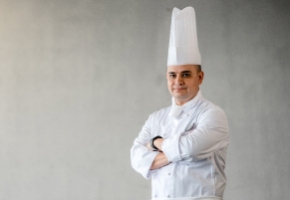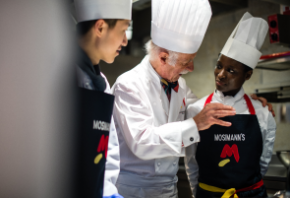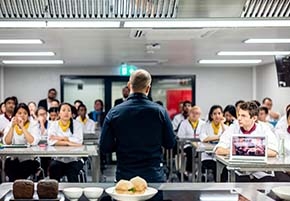- About
- Programs
- Campus Life
- Career Services
- Admissions
- News & Events
- Alumni
Sous Chef: Responsibilities, Skills & Career Opportunities
Explore the roles, responsibilities, and career path of a sous chef. Learn how to advance in the culinary world and take the next step in your career today!
Key Takeaways
- A sous chef is responsible for supervising the kitchen staff, overseeing food preparation, planning and developing the menu, and ensuring that food meets safety standards.
- A successful sous chef needs skills like strong cooking, communication, leadership, teamwork, attention to detail, time management, and multitasking.
- A strong foundation of culinary skills and knowledge is best acquired through formal education, such as earning a bachelor's degree or diploma from an accredited culinary institution.
Have you ever thought about what goes on behind the scenes in a restaurant? Imagine last-minute reservations, the clatter of pans, and the focused energy of a team working together following recipes. At the center of it all is the sous chef, ensuring every dish is a masterpiece and keeping the kitchen running like clockwork.
What Is a Sous Chef?
A sous chef is also known as second-in-command in a professional kitchen as they work under the leadership of executive chefs. The term "sous" derives from the French word for "under" and refers to the position's role as the executive chef's right hand. This leadership role requires a combination of culinary expertise, management skills, and the ability to work well in a fast-paced environment.
Sous chefs ensure the use of high-quality products and supervise food preparation to uphold recipe accuracy and kitchen standards. They also step up to lead the kitchen when the executive chef is unavailable.
Key Responsibilities of a Sous Chef
A sous chef is responsible for maintaining kitchen standards from quality to cleanliness. A day in the life of a chef includes supervising staff to ensure an efficient work environment, overseeing food preparation to maintain consistent quality, and assisting in menu planning and development.
Supervising kitchen staff
A sous chef is responsible for managing the kitchen team, assigning tasks based on each staff member's skills and expertise. They delegate responsibilities to line cooks, prep cooks, and kitchen assistants to ensure the kitchen operates efficiently. Beyond task management, sous chefs offer on-the-job training, mentoring, and guidance to help staff improve their overall performance and techniques.
They keep everything running smoothly by cultivating a collaborative environment and offering constructive criticism to maintain high-quality standards. They address any issues that may arise, like correcting mistakes, handling delays, and supervising the dish-service staff to ensure everything is on time.
Overseeing food preparation
When overseeing food preparation, sous chefs make sure that staff follow recipes precisely, maintain proper portion sizes, and present dishes according to the restaurant's guidelines.
Sous chefs also check the quality of ingredients to ensure they are fresh and ready to use. They conduct taste tests and perform final checks before serving dishes to clients. To address food waste, a common issue in restaurants, they minimize it by managing portion control and optimizing the preparation time.
Menu planning and development
The sous chef works closely with the executive chef to plan and develop menus for daily service, seasonal updates, or any special events. They give ideas on how to create new dishes or improve existing ones to make the menus more appealing.
During their planning process, they consider product availability, customer preferences, and the latest food trends. Sous chefs also calculate food costs, determine portion sizes, and increase profitability as they keep up with high-quality standards.
Ensuring compliance with health and safety standards
Kitchens must meet all health and safety standards, and a sous chef achieves this by enforcing strict cleanliness and sanitation requirements. They supervise cleaning schedules, maintain organized workstations, and properly store ingredients to prevent contamination. Inspecting the kitchen regularly, including kitchen equipment, is another responsibility for sous chefs in order to avoid risks and meet food safety standards.
They train kitchen staff on essential health and safety protocols, such as preventing cross-contamination, which can cause food allergies or a mix of tastes. The training also includes teaching staff how to maintain proper food temperatures and manage ingredients safely by correctly handling, storing, and using food items.
How to Become a Sous Chef
Most sous chefs pursue a culinary degree or diploma from an accredited institution and gain experience through apprenticeship or on-the-job training. Additionally, certifications in food safety and kitchen management further improve their qualifications and increase recognition in the industry.
Educational requirements
A career as a sous chef usually requires a combination of formal education and practical experience. Many aspiring sous chefs pursue a bachelor's degree in culinary arts, where they gain essential skills in cooking techniques, kitchen operations, and food preparation. If you're aiming for leadership or management roles, a master's degree can further advance your career.
For example, the Culinary Arts Academy Switzerland (CAAS) offers a Culinary Arts BA program with two specialized pathways: Culinary Arts or Pastry and Chocolate Arts. Students seeking to expand their expertise can pursue the Culinary Business Management MA, designed to prepare graduates for careers as food and beverage entrepreneurs or management professionals.
Reflecting on her experience at CAAS, alumna Kristin Hamberg, a gold medallist at the Culinary Olympics, shared:
Without the school, it would have been tough to force yourself out and achieve your dreams, but CAAS helped a lot with that.
Training and qualifications
Aspiring sous chefs typically begin their careers in entry-level kitchen roles, such as line cooks or commis chefs. These positions provide essential experience in station management and daily kitchen operations.
Apprenticeships and internships under seasoned chefs offer mentorship and hands-on learning, helping individuals master advanced culinary techniques and understand kitchen dynamics. Many culinary professionals also attend workshops and specialized courses to stay current with industry trends and enhance their skills.
At CAAS, students receive hands-on training alongside renowned chefs. This immersive approach allows them to refine their culinary techniques while developing their unique styles. The BA program also highlights practical experiences, with students spending over 1,100 hours honing their skills in the kitchen. The program includes a 6-month internship opportunity in Switzerland or abroad, providing valuable real-world experience that prepares students for success in the culinary industry.
For example, Kimani Kiarie, an alumnus of CAAS, secured an internship placement at the Dorchester Collection (Le Maurice) in Paris through the International Recruitment Forum, where he met with different employers. He is now the founder and owner of Five Senses in Nairobi, Kenya.
Certifications
Culinary certifications can significantly enhance a sous chef's reputation and career opportunities. They help expand leadership and technical skills, as well as knowledge of food safety, which are essential for career advancement.
Many chefs pursue specialized certifications to deepen their expertise in specific areas, such as pastry arts, vegetarian cuisine, or advanced techniques like molecular gastronomy.
CAAS offers structured certification programs that enable students to earn recognition and qualifications at every stage of their training. For example, students can complete parts of the program and still graduate with a certificate, which can be especially practical for those who want to build their careers step by step. Some of these certifications include:
Swiss Diploma in Culinary Arts: This program offers a well-rounded knowledge of essential cooking skills and techniques, international cuisine, and kitchen management.
Swiss Diploma in Pastry Arts: Those interested in desserts and baked goods can join this program to build their baking, confectionery, and advanced pastry skills.
Swiss Certificate in Vegetarian and Plant-Based Culinary Arts: This certification is especially valuable for those who want to specialize in plant-based cuisine or add vegetarian and vegan options to their dishes and restaurants.
Essential Skills Required to Become a Successful Sous Chef
A successful sous chef possesses technical, organizational, and interpersonal skills. Beyond the art of cooking, a sous chef also plays an important role in kitchen management, team coordination, and maintaining high culinary standards. The following are key skills required for success in this career:
- Cooking skills - A deep understanding of culinary skills, including different cooking techniques, food safety, and flavor balancing.
- Kitchen equipment skills - Understanding and effectively using various tools and appliances used to prepare, cook, and store food in the kitchen.
- Communication skills - Clear communication to coordinate with the kitchen staff, front-of-house teams, and suppliers, as well as giving instructions and handling criticism professionally.
- Leadership and teamwork skills - Motivating, leading, and delegating tasks to the kitchen team to ensure smooth kitchen operations.
- Attention to detail - Maintaining consistency, taste, high food quality, safety, hygiene and food trends.
- Time management skills - Prioritizing tasks to meet service demands and coordinate efficiently between kitchen and front-of-house staff.
- Multitasking skills - Supervising cooking, inventory, and staff training to maintain efficiency on a daily basis.
Benefits of Becoming a Sous Chef
While becoming a sous chef comes with many responsibilities, there are also advantages to the role. Growth opportunities and job security are the key benefits of this career.
Multiple career pathways
A sous chef career is a stepping stone to a variety of higher culinary positions. The most common advancement includes becoming an executive chef who manages the entire kitchen's operations. Sous chefs can further specialize by moving into roles such as chef de cuisine, pastry chef, or experts in a particular cuisine or kitchen function. Some sous chefs also opt for managerial positions, including kitchen or food and beverage manager, where they budget, control inventory, and perform operational planning.
As the culinary industry evolves, food trends like farm-to-table dining, sustainability, and the integration of international cuisines create more opportunities for specialization and career advancement.
Job outlook
The demand for skilled sous chefs is expected to grow due to the expansion of restaurants, catering services, and hospitality venues. The global food service industry is expected to reach approximately €3,629,000 million by 2030, with an annual growth rate of 2.9% (from 2024 to 2030). This growth is driven by the increasing demand for food service market trends like different culinary experiences, the popularity of specialty restaurants like vegan and vegetarian, and a strong tourism sector. Aspiring sous chefs who are up-to-date with industry developments and master the latest culinary trends will have the advantage of high-level job positions.
Achieve Culinary Success as a Sous Chef
Becoming a sous chef is a fulfilling career path that combines culinary skills, leadership, and creativity. This role hones cooking and management skills and creates new opportunities for executive chief positions and specialized culinary fields. The increasing demand for skilled professionals in the restaurant industry makes sous chefs essential in modern dining experiences.
Whether you're passionate about leading a kitchen, mastering new techniques, or managing operations, the role of sous chef can be your stepping stone toward long-term success in the culinary world.
To take the next step in your culinary career, explore our culinary arts programs. Apply today to set yourself up for success in the kitchen!
Frequently Asked Questions (FAQs)
What's the difference between a sous chef and a chef de partie?
A sous chef is sometimes referred to as the "second chef" and manages daily operations, sometimes stepping in for the head chef as necessary. On the other hand, a chef de partie is responsible for a specific station and prepares dishes within that section of the kitchen.
How long does it take to become a sous chef?
It typically takes around 5-10 years to become a sous chef, with a combination of formal education and hands-on experience.
Interested in becoming a world-class chef? Learn more about Culinary Arts Academy Switzerland. Download our brochure.





















